"Arakcheev died. I regret it all over Russia alone ..."
Two hundred years ago, in 1816, around 500, thousands of peasants and soldiers of the Russian Empire were transferred to the position of military settlers. What was it - exorbitant cruelty or unsuccessful social experiment? To answer this question, let us turn to the personality of the main executor of a large-scale plan.
During his lifetime he was nicknamed by his contemporaries the "Serpent". And he died in the spring thaw, when his Georgian village was cut off from the outside world. There was no one around - only a priest and a duty officer sent from the capital.
The former omnipotent courtier suffered from pain, and even more from the consciousness that not a single person would spare his death. He was mistaken - a week later by hearsay, the composer Pushkin he knew wrote to his wife: "Arakcheev died. I am sorry for this all over Russia alone. I could not see him and talk a lot."
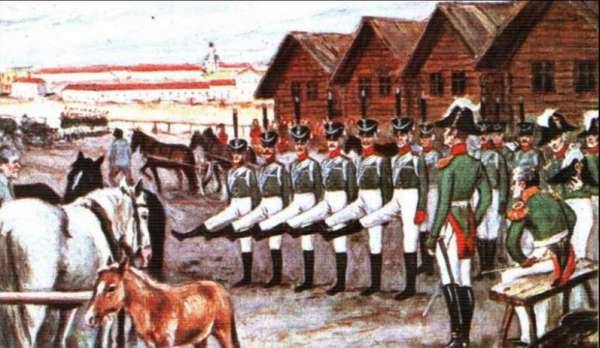
Junior Cadet
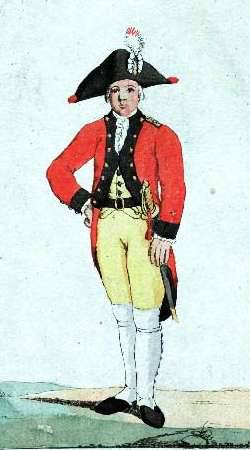
In Russian stories Alexey Andreevich Arakcheev remained the embodiment of cruelty, stupidity, cane discipline. His very appearance disgusted. Major General Nikolai Sablukov recalled: "Arakcheev looked like a big monkey in uniform. He was tall, thin ... he had a long thin neck, on which he could study the anatomy of his life. He had a thick, ugly head, always tilted the side; the nose is wide and angular, the mouth is big, the forehead is hanging ... The whole expression of the face was a strange mixture of intelligence and anger. "
He was born in September 1769 in a remote corner of the Tver province, in the family of a retired lieutenant of the guards. The man is soft and dreamy, he completely shifted the economy and the upbringing of four children on the shoulders of his active spouse. It was she who instilled diligence, frugality and love of order to the eldest son Alexey. Parents wanted to make him a clerk and gave in training to the local clerk. But once Alyosha saw the sons of a landowner neighbor who had come for the holidays from the cadet corps. Their red uniforms and wigs sprinkled with powdered wigs struck the boy so much that he threw himself on his knees in front of his father: "Papa, give me to the cadets, or I will die of grief!"
In the end, the parents sold three cows and took the 12-year-old Aleksey to St. Petersburg artillery cadet corps with the money they received. Long months of waiting began - the officials sent the father and son to the authorities, hinting that the issue could be solved for a modest bribe. But there was no money - the money taken from the house was spent a long time ago, and the Arakcheyev even had to beg. However, fate took pity on them. During a regular visit to the corps, Alexey saw his director Count Melissino and, falling at his feet, screamed: "Your Excellency, accept me as a cadet!" The count regretted the skinny, ragged youth and ordered him to be enrolled in the corps.
Officer "funny regiment"
At that time it was the best school in Russia for training gunners. True, the pupils were fed poorly and flogged for every offense, but this did not bother the young Arakcheev - he was determined to make a career. "Especially distinguished by success in the military-mathematical sciences, and to the sciences of words does not have a particular tendency" - lines from his certificate for the first year of study. Alexey loved mathematics and easily multiplied complex numbers in his mind until the end of his life. At fifteen, he became a sergeant, receiving the right to punish negligent comrades. By his own boastful confession, he so zealously wielded with a stick and his fists, that "he turned the most clumsy and unwieldy into deft ones, and the lazy and low-active ones rehearsed the lessons."
In 18 for years, with the rank of lieutenant, he graduated from the corps, but remained with him as head of the library, from which he mercilessly expelled all fiction that contributes to "embarrassment of the mind."
And soon an event occurred that provided Arakcheev with a brilliant career takeoff. The heir to the throne, Pavel Petrovich, asked Count Melissino to provide him with an intelligent artilleryman for service in the Gatchina "amusing" army. It was created by Empress Catherine in order to keep the unloved son away from power - his mother gave him three thousand soldiers, let him play the war. However, Paul created from them a real army with strict discipline. And he immediately noted the knowledge and official zeal of the young lieutenant, who led the "amusing" artillery in exemplary order.
Soon Arakcheev received the right to dine at the same table with the heir, and then he was entrusted with the command of the entire Gatchina garrison. He served not for fear, but for conscience - from morning till night he went around the barracks and the parade grounds, seeking for the slightest disruption. Paul told him more than once: "Wait a bit, and I will make a man of you."
This hour came in November 1796, when the heir ascended to the throne after the long-awaited death of the mother.
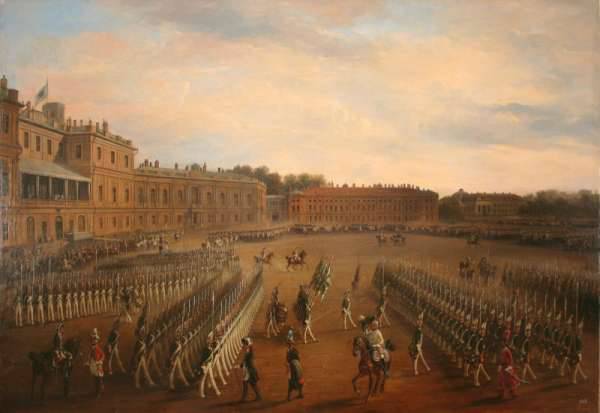
Chief Artillery Inspector
All Russian emperors loved the army, but Pavel adored it endlessly, trying to transform the whole of Russia along the lines of its “amusing” regiment. Arakcheev became his first assistant. Immediately after his accession to the throne, the emperor made him a general, commandant of the capital and chief inspector of artillery. Summoning his son Alexander, he joined his hand with Arakcheyev’s hand and commanded: "Be friends and help each other!"
The new general was ordered to restore discipline in the army — Paul believed that her mother completely dissolved her. Alexey Andreevich immediately began to go around the troops, mercilessly punishing violators. There are stories about how he himself cut off the mustache of the soldiers prohibited by the new charter, and one private soldier bit off his ear in a rage. At the same time, he also cared about the structure of the soldiers' life - good nutrition, availability of a bath, and cleaning of the barracks. Strictly punished the officers who stole the soldiers' money.
They tried to please him with gifts, but he meticulously sent them back.
One of the officers, driven to despair by his constant quibbles, committed suicide, and in February 1798, Paul sent his pet to resign. However, two months later, Arakcheev returned to service, and in May of the following year he received the title of Count for "excellent diligence." His new coat of arms adorned the famous motto "Without adulation is betrayed," which the ill-wishers immediately altered to "devil, flattery is betrayed." However, this did not save the new opals, this time because of his brother Andrey, who was threatened to be expelled from the regiment. Arakcheev made it so that the order for exclusion was lost ...
Upon learning of this, Paul became furious and ordered the now former favorite in 24 hours to leave the capital. Arakcheev went to the village presented to him of the Georgian province of Novgorod. After the treacherous murder of Paul, Alexander, who spoke very unflatteringly about his former tutor, came to the throne and said that he would not bring “this monster” closer to himself even on pain of death. It seemed that Arakcheev had no chance to return to the capital ...
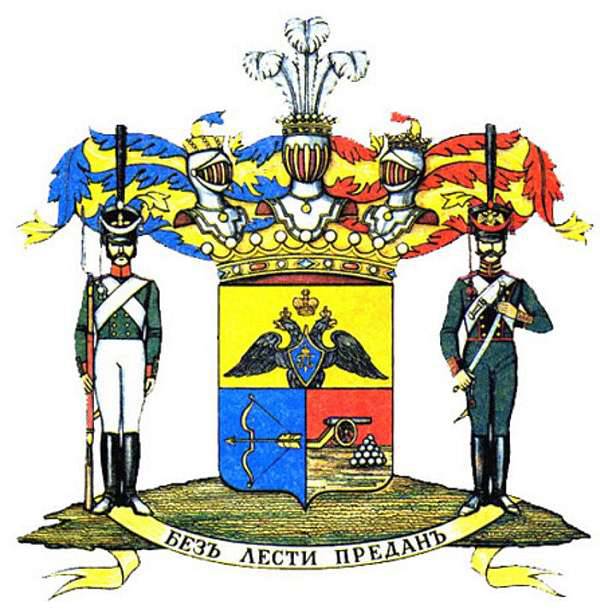
Rural reformer
Arakcheev spent four years in Georgia, where, with his usual zeal, he took up farming. Peasant huts were demolished, instead they built stone houses, stretched in a line along perfectly straight streets. The center of the village was decorated with a magnificent temple and the house of Alexei Andreevich with an extensive park and a pond, in which swans swam. In Georgia, a hospital was set up, where a doctor discharged from St. Petersburg treated peasants for free. There was a school where children learned to read, also for free. Every Saturday, residents of the village were gathered in the square to read out to them the new instructions of the master, necessarily indicating how many lashes the violators owed. However, Arakcheev used not only the stick, but also the carrot: he gave cash awards to the best workers, and he wore clothes from his shoulder to the village elders, where there was the most order.
Not a single aspect of peasant life was left unattended by the corrosive reformer. He was also engaged in arranging the personal life of his subjects — once a year he gathered girls and boys who had reached the age of marriage and asked who they wanted to live with. When couples were made, Aleksey Andreevich resolutely shuffled them, saying: "Debt makes you forget pleasure." True, the graph did not forget about his pleasures - he regularly bought from the ruined neighbors young beautiful girls, whom he determined to be his maids. A couple of months gave the annoying maid married, providing a modest dowry.
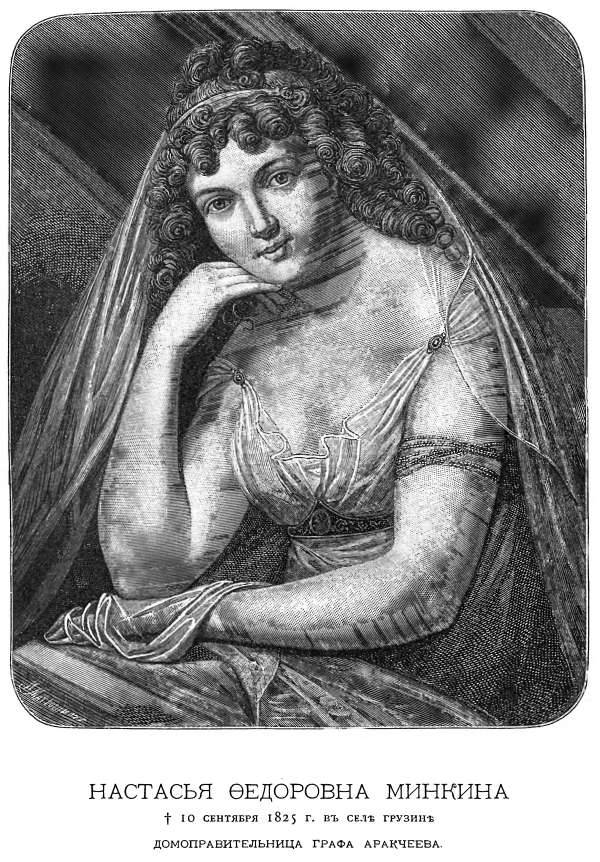
This went on until 1801-year-old daughter of coachman Nastassja Minkina came to the estate in 19 year. Dark, black-eyed, sharp in movements, she was able to guess without words the wishes of her master and instantly fulfill them. The village women considered her a witch, bewitching their master. With all the stern, with her he was gentle and helpful, showered with gifts, took with him on trips. She tried her best to become not just his friend, but also an assistant - having received the position of housekeeper, sought out disorder and immediately informed Arakcheeva about them. According to her denunciations, those who drank, were lazy at work, missed church services, or pretended to be ill were unmercifully cut. The mistress of the graph strictly obeyed moral standards, punishing those seen in "sinful copulation." They were whacked for several days in a row, in the morning and in the evening, and the worst ones were planted in the edikul, a damp and cold basement that played the role of a home prison.
Gradually Nastasya grew bolder and began to play the role of sovereign in the estate. In order to bind the graph more tightly to her, she bore him a son - or, according to other information, simply bought a newborn baby from a young widow. Having received the name of Mikhail Shumsky, he later became an aide-de-camp, a drunken drunk and a card player than spoiled a lot of blood to his father. Nastasya also had a penchant for drinking, which soon deprived her of her natural beauty. One of the guests of the Georgian remembered her as a "drunk, fat, pockmarked and angry woman."
Not surprisingly, Arakcheev began to cool off to his beloved. Moreover, in the spring of 1803, Alexander I appointed him inspector of artillery, and he returned to the capital.
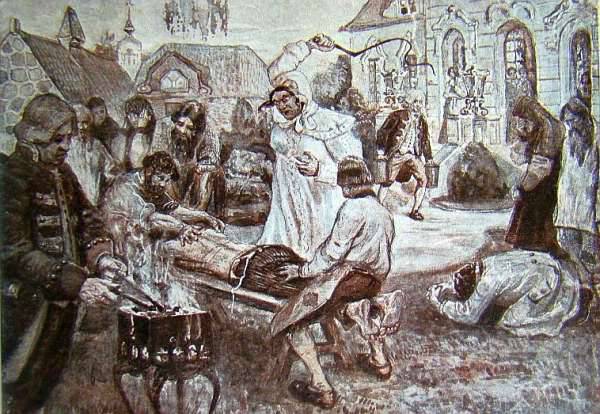
Minister
Having sat in Georgia, Arakcheev launched a stormy activity and in a short time made the artillery units the best in the army. Almost daily, orders were issued from his pen about the manufacture of new tools according to the European model, about organizing the supply of gunpowder, horses and provisions, and about training recruits. At the beginning of 1808, he was appointed Minister of War and in the same year he commanded the Russian army in the war with Sweden. With "remarkable energy" he organized a winter hike on the ice of the Gulf of Bothnia, which led the Russians under the walls of Stockholm and forced the enemy to surrender. True, Alexey Andreevich did not participate in any battle - at the sounds of shooting he turned pale, did not find a place for himself and tried to hide in a shelter.
The great organizer turned out to be a worthless commander and, in addition, a coward.
In 1810, Arakcheev left the post of minister, but the entire war with Napoleon remained at headquarters, next to the king. "The whole French war was going through my hands," he admitted in his diary. “Without flattery, the devotee” favorite carried considerable responsibility both for success and for miscalculations of the Russian strategy. On the day after the fall of Paris, the king issued a decree on his production to field marshals, but Arakcheev refused. Assessing such modesty, Alexander ordered him to implement his cherished dream - the creation of a system of military settlements in Russia. Later, all the blame for this was laid on Arakcheev, but the facts say that the initiative came precisely from the emperor - Alexey Andreevich, as always, was only a faithful performer.
In 1816, about 500 thousands of peasants and soldiers were transferred to the position of military settlers — after the grueling exercises of the drill, they also had to do rural labor. This caused discontent, revolts began, which were brutally suppressed. Yet settlements continued to exist, and many of them flourished — thanks to Arakcheev’s efforts, as in Georgia, schools and hospitals were built, roads were laid, economic innovations were introduced. According to the graph, the "ideal" system of settlements was supposed to help the peasants make money and buy out their land and landowners. He even drafted and submitted to the emperor a draft of the gradual abolition of serfdom - in the opinion of historians, more progressive than the one that was carried out in the 1861 year.
Alas, contemporaries did not notice this - they saw only Arakcheev’s intention to force all Russia to go in line and continued to quietly honor him with “cannibal” and “monster”.
Last opal
In the autumn of 1825, the count's servants, tired of enduring nagging and punishing Nastasya, incited the cook, Vasily Antonov, to kill the hated housekeeper. In the morning, Vasily entered the house, found Minkina sleeping on the couch and cut her throat with a kitchen knife. Arakcheev was in despair. Day and night he carried with him a handkerchief soaked in the blood of the slain. On his order, the cooks were spotted to death, and the customers of the murder were poured in a hundred whips and sent to penal servitude. While the count was investigating, he heard about the death of the emperor in Taganrog ...
Having lost almost simultaneously two closest people, Arakcheev fell into a stupor. The new king repeatedly called him to the court, but he did not react. The overbearing Nicholas I could not tolerate such insubordination and gave the unloved order to his father’s pet — to ask for his resignation without waiting for his dismissal. Arakcheev did just that and in April 1826, he finally retired to Georgia "for treatment."
The remaining years of his life were gray and dreary. In the summer he could still manage chores or plant flowers in memory of Nastasya who loved them. But in winter, boredom was piling up. The guests did not come to him, Alexey Andreevich did not learn to read, and wandered around the rooms all day, solving mathematical problems in his mind.
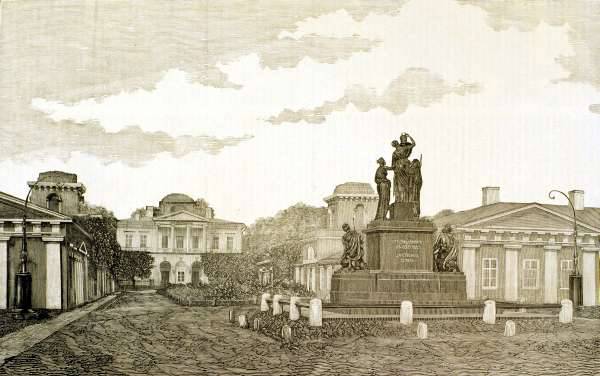
In his estate, he created a real cult of the deceased Alexander I. In the room where the emperor once spent the night, his marble bust was set up with the inscription: "Who dare to touch this, be cursed." The king's pen, his letters and papers, as well as the shirt in which Alexander died were also kept there — Arakcheyev bequeathed in it to bury himself. In front of the temple in Georgia, he erected a bronze monument to the "sovereign benefactor", which reached Soviet times. Other buildings briefly outlived their creator - the peasants destroyed the park with foreign flowers, dismantled the fence along the main street, caught and ate the swans who lived in the pond.
All this happened after 21 April 1834, Arakcheyev died of pneumonia.
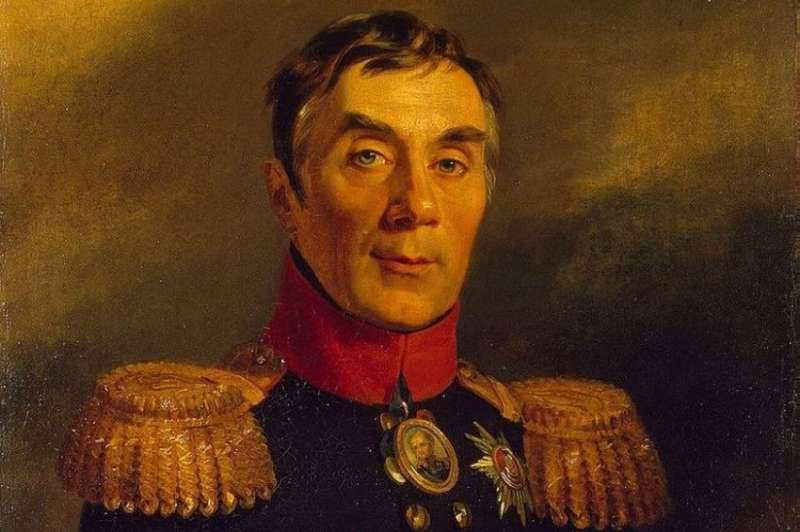
Information